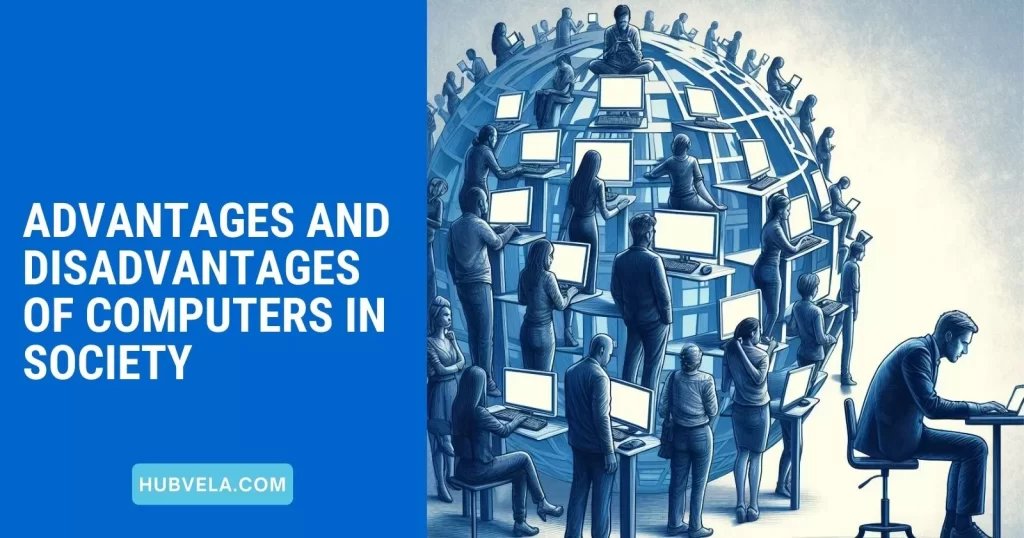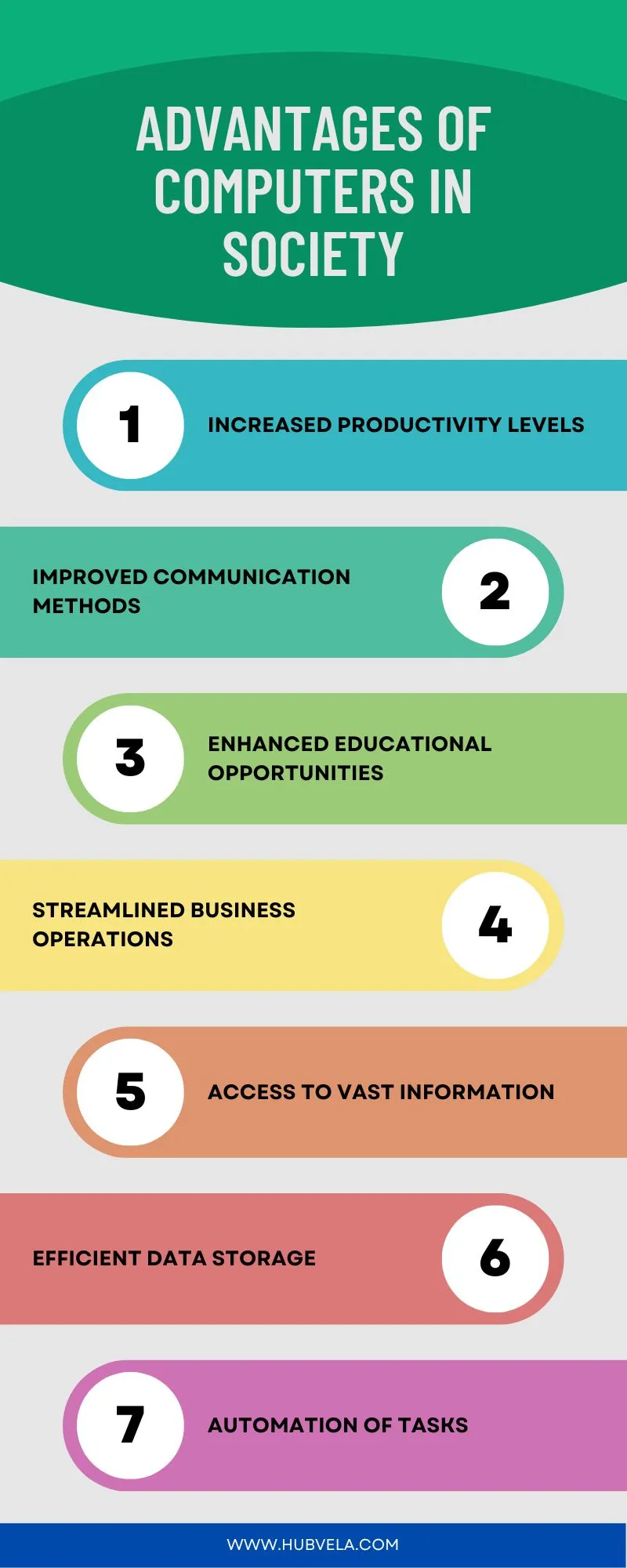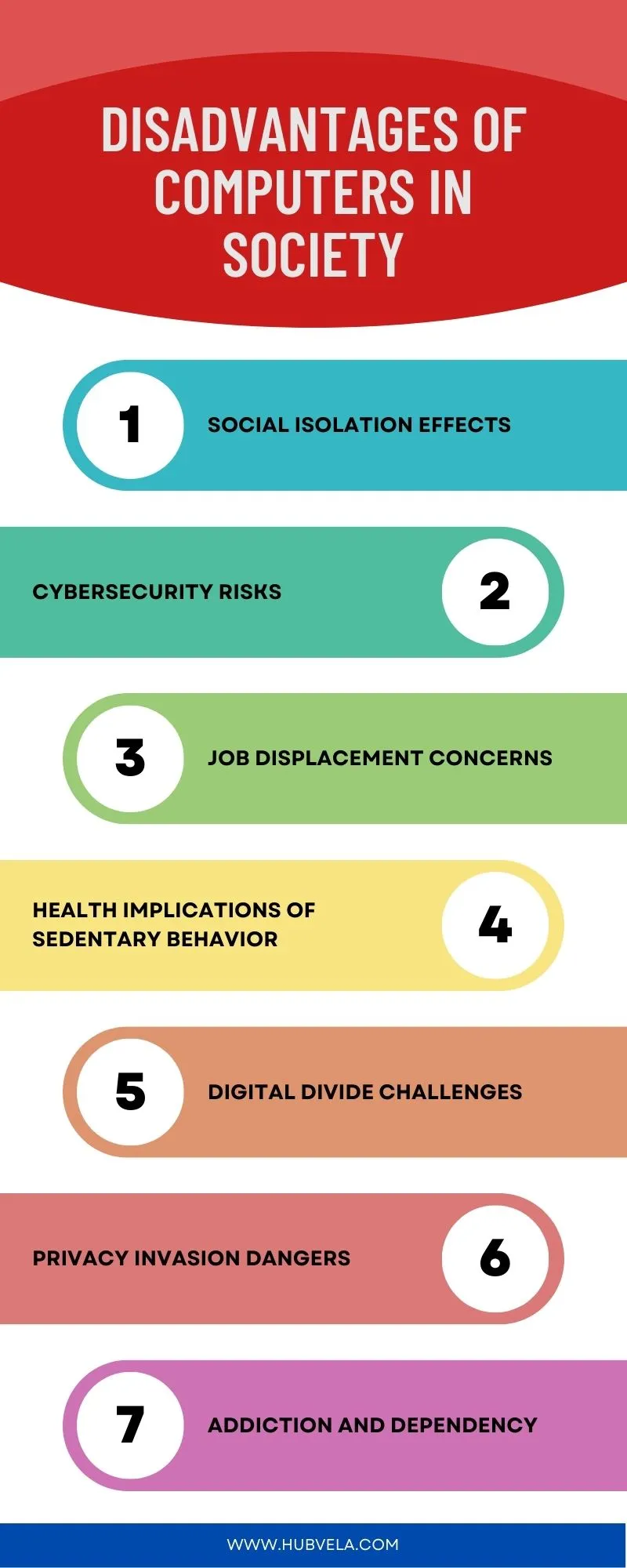Are computers the ultimate saviors or the greatest villains of our modern society? Well, brace yourself, because the advantages and disadvantages of computers in society are nothing short of mind-blowing!
From skyrocketing productivity levels to revolutionizing communication methods, these digital wonders have undoubtedly transformed the way we live, work, and learn.
But hold your horses, there’s a catch! As with any powerful tool, computers also come with their fair share of drawbacks. The digital divide, invasion of privacy, and the looming risk of addiction and dependency are just a few of the dark clouds that hover above this technological marvel.
So, get ready to dive into the world of computers, where the benefits are immense, but the dangers are lurking around every corner.

--Advertisement--
Advantages of Computers in Society
The advent of computers has revolutionized society, offering numerous advantages that have transformed the way we live, work, and communicate. Some of the key benefits of computers in society include:

1. Increased Productivity Levels
With computers, you can significantly increase your productivity levels in society. The increased efficiency provided by computers allows for faster completion of tasks. With proper time management, you can prioritize and organize your work effectively.
Computers also enable remote work, allowing you to work from anywhere at any time, resulting in increased productivity. The ability to multitask on computers further enhances productivity by allowing you to work on multiple tasks simultaneously.
Technological advancements have made computers faster and more efficient, enabling you to complete tasks in less time. Overall, computers have revolutionized the way we work, making it easier to accomplish tasks, manage time effectively, and increase productivity levels in society.
2. Improved Communication Methods
To enhance communication in society, computers offer a multitude of advantages. One of the key benefits is improved collaboration. With computers, individuals can work together on projects, share ideas, and make real-time changes to documents simultaneously.
Instant messaging is another powerful tool that computers provide, allowing for quick and efficient communication between individuals and groups.
Video conferencing takes communication to the next level by enabling face-to-face conversations regardless of geographical location.
Computers also provide global connectivity, allowing people from different parts of the world to connect and communicate with ease.
Lastly, computers facilitate efficient information exchange, enabling the seamless transfer of data and knowledge.
3. Enhanced Educational Opportunities
You can maximize educational opportunities through the enhanced capabilities that computers offer.
Online learning has become increasingly popular, allowing students to access courses and educational resources from anywhere in the world.
Computers provide personalized instruction, tailoring lessons to individual needs and learning styles.
With the vast amount of educational resources available online, students can explore a wide range of topics and deepen their understanding.
Distance education has also been made possible through computers, enabling individuals to earn degrees or certifications without physically attending a traditional classroom.
Furthermore, computers facilitate academic research by providing access to a wealth of information and databases. From scholarly articles to historical documents, computers enable students to conduct comprehensive research and support their academic endeavors.
4. Streamlined Business Operations
How can computers streamline business operations and provide advantages in society?
Computers have revolutionized the way businesses operate, leading to improved efficiency, cost savings, better decision making, flexibility in operations, and reduced human error.
With the help of computers, businesses can automate repetitive tasks, allowing employees to focus on more strategic and value-added activities. This increased efficiency translates into cost savings, as businesses can achieve higher productivity with fewer resources.
Moreover, computers enable businesses to analyze vast amounts of data quickly and accurately, facilitating better decision making.
Additionally, computers provide flexibility in operations, allowing businesses to adapt and respond to changing market demands more effectively.
5. Access to Vast Information
Businesses can harness the power of computers to access vast amounts of information, further enhancing their streamlined operations. With digital literacy becoming increasingly important in today’s technology-driven world, businesses are able to navigate through the vast resources available online.
However, with this access to vast information comes the risk of information overload. It’s crucial for businesses to have the necessary skills to filter through the abundance of data to extract relevant and valuable insights.
Furthermore, computers have revolutionized online learning, allowing businesses to provide their employees with continuous training and development opportunities. However, the issue of data security remains a concern. As technological advancements continue to shape the digital landscape, businesses must prioritize the implementation of robust cybersecurity measures to protect sensitive information from unauthorized access.
6. Efficient Data Storage
One advantage of computers in society is their ability to store data efficiently. With the advancements in technology, computers can now handle large amounts of data and retrieve it quickly and accurately.
Cloud storage solutions have emerged, allowing users to store their data remotely and access it from anywhere with an internet connection. This not only provides convenience but also ensures that data is backed up and protected.
To ensure data security, various measures such as encryption and authentication protocols are implemented. Additionally, data backup strategies are put in place to prevent data loss in case of system failures or disasters.
Efficient data storage is crucial in today’s digital age, and computers play a vital role in providing reliable and secure solutions for data management.
7. Automation of Tasks
Automate your tasks with computers to increase efficiency and productivity in society.
Computers have revolutionized various industries through automation. One area where automation has made a significant impact is in manufacturing. Automated manufacturing processes, controlled by computers, have improved production speed, accuracy, and quality.
Self-driving cars have also emerged as a major technological advancement, reducing the need for human intervention in transportation.
Robotic surgery, another application of computer automation, has transformed the medical field by enabling precise and minimally invasive procedures.
Smart homes, equipped with automated systems, offer convenience and energy efficiency.
Virtual assistants, powered by artificial intelligence, can perform tasks such as scheduling appointments and answering queries.
Disadvantages of Computers in Society
Computers have become an integral part of our lives, providing numerous benefits in different areas. However, with any benefits, there come disadvantages. The disadvantages of computers in society include:

1. Social Isolation Effects
You may experience increased social isolation when using computers. This can have negative effects on your mental health and overall well-being.
As computers become more prevalent in society, the lack of social interaction caused by excessive computer use is a growing concern. People are becoming increasingly reliant on technology for communication, leading to a decrease in face-to-face interactions and a weakening of social connections.
The constant use of computers can create a sense of technological dependence, where individuals feel isolated and disconnected from the real world. Additionally, communication barriers can arise when relying heavily on computer-mediated communication, such as misunderstandings and misinterpretations.
It’s important to strike a balance between computer use and maintaining healthy social relationships to avoid the detrimental effects of social isolation.
2. Cybersecurity Risks
Excessive reliance on computers can expose you to a multitude of cybersecurity risks, which can have detrimental effects on your personal and professional lives.
One of the major risks is data breaches, where unauthorized individuals gain access to sensitive information, such as personal and financial data.
Online scams are another concern, as cybercriminals use deceptive tactics to trick you into revealing personal information or making fraudulent payments.
Identity theft is a significant risk, where cybercriminals steal your personal information to commit various crimes in your name.
Malware attacks are also a threat, as malicious software can infect your computer and compromise its security.
Lastly, phishing attempts involve cybercriminals posing as trustworthy entities to trick you into revealing sensitive information.
It’s crucial to stay vigilant and take necessary precautions to protect yourself from these cybersecurity risks.
3. Job Displacement Concerns
With the increasing integration of computers in society, concerns arise regarding job displacement. The job market impact of this technological advancement is significant.
As computers automate various tasks, there’s a risk of technological unemployment, where jobs become obsolete due to machines taking over. This poses a challenge for individuals who may need to adapt to changing workforce requirements. The skill requirements for jobs are constantly evolving, and those who are unable to keep up may find themselves at a disadvantage.
Moreover, the economic implications of job displacement can be profound. The loss of jobs can lead to financial instability for individuals and communities, and it may take time for new industries to emerge and absorb the displaced workforce.
It’s crucial to address these concerns and find ways to ensure a smooth transition in the face of technological advancements.
4. Health Implications of Sedentary Behavior
Sitting for long periods of time while using computers can lead to a sedentary lifestyle, contributing to various health problems. The health risks associated with a sedentary lifestyle are well-documented.
Physical inactivity, often caused by excessive computer use, has been linked to an increased risk of obesity, which has become an epidemic in many societies. Being overweight or obese can lead to a host of health issues, including cardiovascular diseases such as heart disease and stroke.
Additionally, prolonged sitting can also result in musculoskeletal problems, such as back and neck pain.
To mitigate these health risks, it’s important to incorporate regular physical activity into your daily routine, take frequent breaks from sitting, and practice good posture while using computers.
5. Digital Divide Challenges
To address the disadvantages of computers in society, you need to tackle the challenge of bridging the digital divide. The digital divide refers to the gap between those who’ve access to technology and those who do not. This divide creates several challenges, including technological literacy challenges, internet access disparities, and the impact on marginalized communities.
Technological literacy challenges arise as individuals who lack access to computers and the internet struggle to develop the necessary skills to navigate and utilize technology effectively. Internet access disparities further exacerbate this issue, as some communities have limited or no access to reliable internet connections. Marginalized communities, such as low-income neighborhoods or rural areas, are disproportionately affected by these disparities, leading to educational inequalities and limited economic opportunities.
Economic barriers also play a significant role, as the cost of purchasing and maintaining computer equipment and internet services can be prohibitive for some individuals and communities. Bridging the digital divide is crucial to ensure equal access to technology and the opportunities it provides.
6. Privacy Invasion Dangers
Privacy concerns have become a significant issue due to the widespread use of computers. One of the main dangers is the risk of data breaches, where unauthorized individuals gain access to sensitive information stored on computer systems.
Online surveillance is another threat to privacy, as governments and corporations can monitor your online activities without your knowledge or consent.
Identity theft is a growing problem, with hackers stealing personal information to commit fraudulent activities.
The exposure of personal information on the internet is also a concern, as it can be accessed by anyone with malicious intent.
It’s crucial to be cautious with your online presence and take steps to protect your privacy in this digital age.
7. Addiction and Dependency
One major concern that you should be aware of is the potential for addiction and dependency when it comes to computers in society.
While computers offer numerous advantages, such as increased productivity and access to information, there are also negative consequences associated with their excessive use.
Psychological effects, such as internet addiction and technology dependency, can have a detrimental impact on individuals. Internet addiction, for example, can lead to negative consequences like impaired social relationships, reduced academic performance, and even physical health issues.
Moreover, dependency on technology can result in social withdrawal and isolation, as individuals become more engrossed in their virtual lives instead of engaging in real-world interactions.
It’s crucial to be mindful of these risks and maintain a healthy balance between technology use and other aspects of life.
Conclusion on Advantages and Disadvantages of Computers in Society
You can clearly see the advantages and disadvantages of computers in society. When considering the pros and cons, it’s important to acknowledge the impact on employment.
On one hand, computers have led to increased automation, causing job displacement in certain industries. However, they’ve also created new job opportunities in fields such as software development and data analysis.
Another advantage is the educational benefits that computers offer. They provide access to a vast amount of information, allowing for self-paced learning and online courses.
Additionally, computers have brought about societal implications, facilitating communication and connecting people from different parts of the world.
Lastly, computers have driven technological advancements, enabling advancements in various fields such as medicine and engineering.


